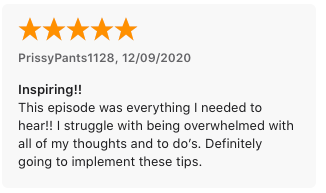LISTEN IN APPLE PODCASTS | LISTEN IN SPOTIFY | LISTEN IN STITCHER

When this episode aired, we’ve just wrapped up the last day of January 2021, so maybe at this point, you’ve already got your whole year mapped out with a 37 point plan of action. Or maybe you’re like me and your year is looking a little more… in flux.
To be completely honest, I’m approaching goal setting a little differently this year. Instead of coming out the gate with a set plan for the year, I’m prepping for a move, a new baby and then inviting the flexibility (and let’s be honest, sleep deprived fogginess) that I know are on the horizon.
Giving myself grace through such a transitional time – a move, and then welcoming a new baby – is going to be key. So I’m looking forward to really digging into goal setting for the second half of the year around May or June.
Just wanted to give you proof that you don’t have to have your whole year – much less your whole life – mapped out right this second. You are not behind, and this is not a race.
But – when you are ready to dive into goal setting, or maybe you want to do a little refresh of your current goals – this episode is your guide to goal setting, the SMART way.
Keep reading to find out:
-
Why you’ve got to be specific when it comes to getting goals if you actually want to achieve them
-
What exactly SMART goals are, plus we’ll take a quick look at other types of goals, too.
-
I’ll cover how you can run your current goals through the SMART filter, or set new goals using the SMART method
-
And finally – you’ll walk away ready to take on and tackle any kind of goal you have for yourself in the coming year.
Grab your copy of The Simple + SMART Goal Setting Cheatsheet so you can make sure that you’re on the right track when it comes to reaching the finish line for your big plans.
If you’re listening to a podcast all about better work, life and balance – then I’m going to bet that you’re a go-getter on a mission to get things done.
That’s why it’s not surprising to me that one of the most requested episode topics that I get from members of the It’s About Time Academy is goal setting – specifically how to set SMART goals.
Although this episode is airing in early 2021 – anytime is a good time to refresh, revamp and revisit our goals. And if you realize you haven’t exactly articulated your goals – what you’re working toward in your personal or professional life – then you’re also in the right place.
So let’s start out by diving into why it’s so important to get specific with your goals.
Why It’s Important to Get Specific with Goal Setting
Let’s say that you’re driving somewhere you’ve never been before – and your phone is dead, and you don’t have GPS… so you have to stop and ask for directions.
Sounds like a total nightmare, right?
Remember MapQuest?
Does anybody remember when we used to print MapQuest directions before we went places? I remember doing that in high school, and early college. Making sure my directions were printed and that I had a fresh CD burned for the drive.
It also cracks me up that my daughter Camilla will likely never understand the concept of burning a CD and choosing the perfect name for the epic mix you just created.
So anyway – imagine a world without GPS, so you stop and ask for directions.
The first person you ask says… “Oh – I kind of know where you’re going. It’s that way. Should take you a few minutes. You’ll know it when you see it.”
That’s not really helpful… right?
No picture of where you’re going.
No clear understanding of how you’re getting there.
The second person you ask says… “Oh! I know exactly where that is. It’s in the building next door to the Taco Bell. It has a blue roof and there’s a big sign with a chicken on it. Pull out of this parking lot and make a left. Then drive about 5 miles and take the first left on Main Street. Then take a right on Center Street and you’re there.”
Well that’s a lot different. Now, you’ve got a clear picture of where you’re going. You know how to get started. You’ve got milestones, timing and specific instructions for getting there.
When you set goals that are unclear, fuzzy or vague – you never really know how you’re doing at any given moment, and you definitely don’t have a way to know whether you’re spending your time on the right things. That leads to wasted time, spinning wheels, confusion and just plain giving up.
If you really want to get where you want to go when it comes to your goals, we’ve got to be specific so we know what the end goal looks like and how we’re going to get there.
And – making your goals SMART – specific, measurable, attainable (or adventurous), relevant and time bound are your keys to setting goals that you can actually achieve.
So what exactly are SMART goals – and hey… aren’t there other types of goals out there too? And some of you might even be thinking… yeah Anna but what about objectives, strategies, tactics, KPI’s and OKR’s.
Before we totally dive into SMART goals, let me do a quick run through of some other goal setting options and possibilities that exist. Some you’ve probably heard of – others maybe not…
Goal-Setting Disclaimer
I want to start off by saying that It’s About Time is a podcast about work, life and balance. As a Time Management Coach and long-time goal setter, I believe that setting clear goals for yourself is one of the many ways that you can find better work, life balance for yourself because clear goals give you something to aim for, and they’re a tool for making decisions about how you spend your time.
This is not a podcast dedicated purely to goal setting or high level management strategy. Not only that – but my word of the year is Simplify, so I am looking for any opportunity to boil down the best parts and the basics of just about anything… goal setting included. That’s why – if you’re a management pro tuning in and you hear that my goal setting terminology might not line up with how your organization or business does goal-setting, or that it’s not 100% aligned with what you learned in grad school – it’s okay. One thing I found in my goal setting research for this episode is that there is no one RIGHT or perfect way to set goals.
There’s not even a 100% agreed upon meaning for each of the letters in SMART!
So – just because what you hear in this episode might be a little different, doesn’t necessarily mean it’s wrong.
different types of goals
Okay – with that said… other types of goals:
A few years ago, I test drove Author and Leadership Coach Michael Hyatt’s Full Focus planner. One thing I liked about this goal-driven planner was that it had space for you to track progress on two types of goals: Habit Goals and Achievement Goals.
Habit Goals & Achievement Goals
Habit goals are exactly what they sound like. Goals centered around making habits stick. They’re ongoing, and all about repetition. Not breaking the chain.
On the flip side, achievement goals have a set end point. You know exactly when you’ve reached the finished line and achieved the goal.
The great thing is, you can apply the SMART filter to both Habit Goals and Achievement Goals, but in slightly different ways.
In this episode, we focus specifically on goals that are more achievement oriented, with an end point – but if you’re looking for more resources and insight into starting habits that stick, I have several episodes dedicated specifically to habits, like Episode 62 and Episode 40, for example.
>> Listen Now: Episode 62 – A Good Kind of Autopilot: 3 Ways to Make New Habits a Part of Your Everyday
>> Listen Now: Episode 40 – These 7 Habits Could Change Your Life
Then, after Habit Goals and Achievement Goals, the next two types of goals that are commonly talked about are Long-Term Goals and Short-Term Goals.
Long-Term Goals & Short-Term Goals
These two time-oriented goal types bring up a lot of questions.
What exactly IS long term? How short is short term?
How many do I need of each?
Just like the answer to many questions in life – the answer is it depends. And one thing I found in my research for this episode is that – once again – there is no set or widely agreed upon definition for long term or short term goals.
Long and Short are both relative terms… So they are what you make them.
You get to decide what long and short mean to you.
Most experts seem to agree that long term goals take a year or more to complete.
But short term goals are a bit all over the place. Some say never longer than six months, some say up to a year.
In some cases a short term goal is a milestone within a long term goal. Like – let’s say your long term goal is to publish a book, one of your short term goals might be to write your book proposal. It’s just one piece of the overall project.
But – a short term goal doesn’t have to be related to a long term goal at all – it can totally stand alone. You can set a short term goal to train for a 5K without committing to run a full marathon, for example.
And when it comes to how many each you should have, one resource I found said that you should always have at least one long term goal, and at least one short term goal. But – as always, it really depends.

Photo Credit: Sarah Becker Photography
Goals, Objectives, Strategies & Tactics
So here’s where goal setting terminology can get a little confusing – and that’s when we start talking about goals, objectives, strategies, and tactics. So I’m going to touch on this briefly, but we’re not going to spend a ton of time here for simplicity’s sake.
GOALS & OBJECTIVES
Goals and Objectives are two terms that are often used interchangeably, but they’re actually different. For a lot of businesses and organizations, Goals are actually meant to be super broad, intangible and kind of vague. Which is basically the opposite of how we’re going to approach them in this episode. And then on the other hand – objectives are super specific statements that describe how you’re going to achieve the goal.
Growing up going to Leadership Camp in the summers – yes, that’s a thing – I’d always learned about setting SMART goals, so 10 years later working in a PR firm and putting together comprehensive public relations plans for clients – everything I’d learned was flipped on its head when I was told that it’s actually Objectives that are supported to be Specific, Measurable, Attainable, Relevant and Time-Bound… And that strategies are how the objectives are reached, and tactics make up the strategies.
I thought my brain was going to break when I got that curveball.
KPIs & OKRs
And then when you throw in things like Key Performance Indicators and Objective and Key Results, KPIs and OKRs – my head really starts spinning. The path to goal setting can get complicated real quick – and when things get complicated, it’s easy to just walk away and hide under a blanket.
Let’s Keep Things Simple, Shall We?
Knowing that there seem to be a million different ways to set goals, and no one right or perfect way to set them – we’re going to pick one, simple way and run with it – and not worry about the rest. Simple.
Sound good?
SMART GOALS
So – let’s stick with SMART goals – since we’ll be doing some personal goal setting, instead of reporting to shareholders or a Board of Directors.
I’m going to walk you through each of the letters in SMART, and as you listen in, I encourage you to think of one goal that you’ve either already set for yourself or that you want to set for yourself. And as you’re listening, think about how you can make tiny tweaks so your goal is just a little bit SMARTer.
S – Specific
First – the S. Specific
Just like the asking for directions example at the beginning of this episode, if you don’t have a clear picture of where you’re going, it’s unlikely you’ll actually get there. Like Alice and the Cheshire Cat… When Alice stops to ask the cat which way she should go… she has no idea where she’s actually going… so the Cat tells her it doesn’t matter which way she goes…
Being specific with a goal is the difference between saying
I want to run more v. I want to train for a 5K.
I want to lower my monthly grocery bill v. I want to spend a maximum of $400 a month on groceries.
I want to make more money v. I want to get promoted to Director or I want to start a side gig making friendship bracelets or I want to ask for a raise. See what happens when we get specific? We can start actually picturing what the end goal looks like and our path to getting there becomes clearer and clearer.
When you really think about it, each of the letters in SMART – specific, measurable, attainable, relevant and timebound are all ways to make the goal more specific.
M – Measurable
Next – the M. Measurable. How will you measure your success or know when you’ve reached your finish line?
Just like the grocery bill example… I want to spend a maximum of $400 a month on groceries – that dollar amount is one way to make a goal measurable. You either hit it, or you don’t.
Same with running the 5K. You either run a 5K or you don’t.
You can make a goal measurable by articulating a clearly defined end point – like getting a promotion, a dollar amount, a distance amount – really anything that gives you the ability to track your progress as you’re moving forward.
A – Attainable or Adventurous
When it comes to the A in SMART – there are a lot of different opinions and options to choose from, some goal setting gurus like to use Actionable here… to make sure that you’re writing the goal in an active, action-oriented way, but I prefer attainable and adventurous.
Is your goal attainable – in that you can actually achieve it. For example, it would not be attainable for me to set a goal to run a marathon in April of 2021. Why is this unattainable? Well – because my second baby is due in Mid-March, and it takes months to properly train for a marathon, especially when you haven’t even gone for a neighborhood jog in quite some time. However, running a marathon in December could be a bit more attainable.
When we set goals that are totally pie in the sky impossible, we’re setting ourselves up for failure, for giving up and for feeling bad. So – make sure your goal is attainable before you dive in.
Oh – but remember I said I also like adventurous for the A. I think it’s important to have at least ONE “reach” goal on your list. Something that would definitely challenge you, maybe take you out of your comfort zone, but is still very possible if you stretch yourself a bit. You’ve got to strike a healthy balance with your attainable and adventurous goals. You’ll know what feels right for you – but just like setting a goal that’s completely unrealistic can be a self-esteem killer – setting too many adventurous goals has the potential to run you ragged, spread yourself too thin, and lead to burnout and exhaustion. So – again, while there’s no perfect formula or right way to do things – challenge yourself with maybe one adventurous goal if you’re feeling it – but try not to go overboard.
R – Relevant

Photo Credit: Sarah Becker Photography
Next up is the R. This is another one that differs from expert to expert. A lot of the same folks who use Actionable as the A use Realistic as the R. But since we use Attainable or Adventurous as the A (which covers Realistic) I prefer Relevant as the R in SMART – as in, relevant to your core values, your existing long-term goals and your current season in life.
Basically – does this goal make sense for where you’re going, who you want to be and the life that you want? Is this goal based on what you really want? Or is it a reflection of someone else’s expectation for you, whether it’s a specific person’s expectation or society’s expectation.
It’s really easy to get caught up in what we *think* we should be doing, and set goals based on what we see friends, family, people on Instagram, other business owners – and believe that in order to be successful, we should be doing what they’re doing or setting the goals that they’re setting – but when it comes down to it, you’re going to be a million times more driven to achieve a goal that is personal and meaningful to you, rather than working toward something that checks a box that someone else drew for you.
So – Is your goal relevant to you and your bigger picture dreams? If not, consider tossing it or putting it on a shelf for later.
T – Time bound
And finally – the T. Time bound. This one is similar to measurable… in that it gives you some parameters, or a deadline. A few years ago I attended Rachel Hollis’ RISE conference in Dallas. It was an awesome experience, but one thing she said that really bugged me is that she didn’t believe in setting Time-Bound Goals. Her reasoning was that if you don’t meet your deadline, it can be super discouraging and cause you to give up.
Yeah, but the thing is… if you keep your goals totally open-ended… there’s no real reason or driving force to keep you moving forward.
Someday is not a day of the week, remember?
I find that removing the Time-Bound aspect of a goal decreases your motivation to actually get started, and it totally works against Parkinson’s Law – a time management principle you’ve probably heard me mention before.
Parkinson’s Law states that Work expands to fill the time available… and that’s true for work toward our goals. Without a boundary, and endpoint, some kind of timing… we could either never get started… or just keep tweaking and tinkering and working on it forever.
So – instead of skipping the T for Time Bound, I do encourage you to set a deadline for yourself, but make it a realistic deadline. Sometimes you can’t come up with that realistic deadline until you do a little research or reverse engineering. And be ready to give yourself grace when things don’t go as planned.
Life happens, we adapt and we adjust – and sometimes we even realize that a goal we set 6 months ago doesn’t quite fit who we’ve become… and that’s okay too.
We’ve walked through why our goals need to be specific in order for us to achieve them, a few different types of goals: habit, achievement, long-term, short-term and then we did a quick dip in and out of some complicated goal setting terminology before diving into each piece of the SMART goal puzzle.
I hope that as you were listening in on each letter in the word SMART that you’ve come up with some great ideas for making your goals more specific, measurable, attainable (or adventurous), relevant and time-bound.
And if you really want to make your SMART goals a reality in the coming year, I’ve got three next steps for you:
Action Items
01. Write your goals down.
First. Write those goals down. Studies show that you’re more likely to achieve your goals whenever you put pen to paper and get them out of your head.
02. Make a vision board.
Second. Make a vision board with an image that represents each of your goals. I used to think that vision boards were totally dumb, but after making my first one back in 2018 I am hooked. Making a vision board and actually posting it where you can see it each day keeps your goals front of mind. They just work. I swear.
03. Find an accountability partner.
And finally Third – Find an accountability partner. Whether you work talk with a mentor, an “accountabilibuddy,” a coworker, a biz bestie, join a mastermind group or work with a coach – having regular accountability check-ins with a partner skyrockets your chances of achieving a goal all the way up to 95%.
Which… if I’m doing my math correctly is almost 100. It’s a no brainer.
LISTENER SPOTLIGHT

PrissyPants1128 – Thank you so much! I’m so excited that you found exactly what you were looking for. It’s true – life can get pretty overwhelming at times, and I’m so glad that It’s About Time can help you create a little peace among the crazy. So happy to have you as a listener and a subscriber! Thanks again!
LINKS & RESOURCES MENTIONED IN THIS EPISODE
FREE RESOURCES
TOOLS
LISTEN
JOIN
-
Join the It’s About Time Academy!



Be the first to comment